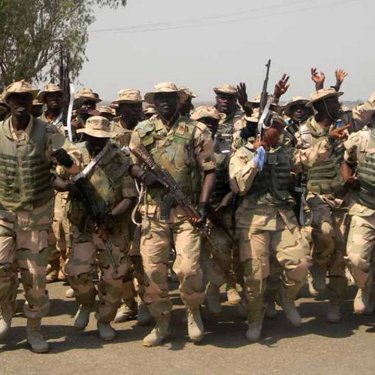Soldiers beat journalists in Abia State press centre

After this week’s attack on journalists by soldiers in Umuahia, the capital of the southeastern state of Abia, Reporters Without Borders (RSF) urges the federal government to send a strong message on the need to end violence and abuses against reporters and respect their work throughout the country.
In the Umuahia incident, a score of soldiers stormed into the Nigerian Union of Journalists press centre on 12 September, beat up some of the journalists there, and smashed or seized smartphones, computers and other equipment containing newly-shot photos and video.
The targeted journalists had just covered Operation Python Dance, a show of strength by the army on the streets of Umuahia with the aim of ending clashes between soldiers and members of the Indigenous People of Biafra, a separatist group that was angered by an army raid on its leader’s home last weekend.
John Emejor, the head of the local branch of the Nigerian Union of Journalists, said the attack on the NUJ press centre was typical of increasingly dictatorial tendencies in Nigeria. He also pointed out the absurdity of destroying reporting material that would have helped to relay the message the army want to convey, namely a demonstration of its ability to use force if needed.
Several hours after the incident, local army commanders went to the press centre to apologize and to give assurances that the soldiers responsible would be identified and punished.
“It is good to see the military accepting responsibility but this event nonetheless shows that perceptions of what journalists do are a real problem in Nigeria,” said Clea Kahn-Sriber, the head of RSF’s Africa desk.
“Journalists are regularly prevented from working and are subjected to violence by security or intelligence personnel. Instead of reacting after the event, the Nigerian government should make an effort to train the security forces about the role of journalists in society and thereby foster better relations between two sectors that are essential in a democracy.”
At least three other journalists have been attacked since the start of the month. Channels Television reporter Segun Salami was badly beaten by security agents in the central state of Kogi on 1 September. And members of the Directorate of State Services (DSS) beat Timothy Agbor of The Point Newspapers and Toba Adedeji of Osun Defender while they were covering a demonstration by civil servants in the southwestern city of Osogbo on 11 September.
RSF has tallied 53 cases of abuses against journalists since the start of the year, including 20 arrests and 23 cases of threats or physical violence.
Nigeria is ranked 122nd out of 180 countries in RSF’s 2017 World Press Freedom Index after falling six places in a year.



